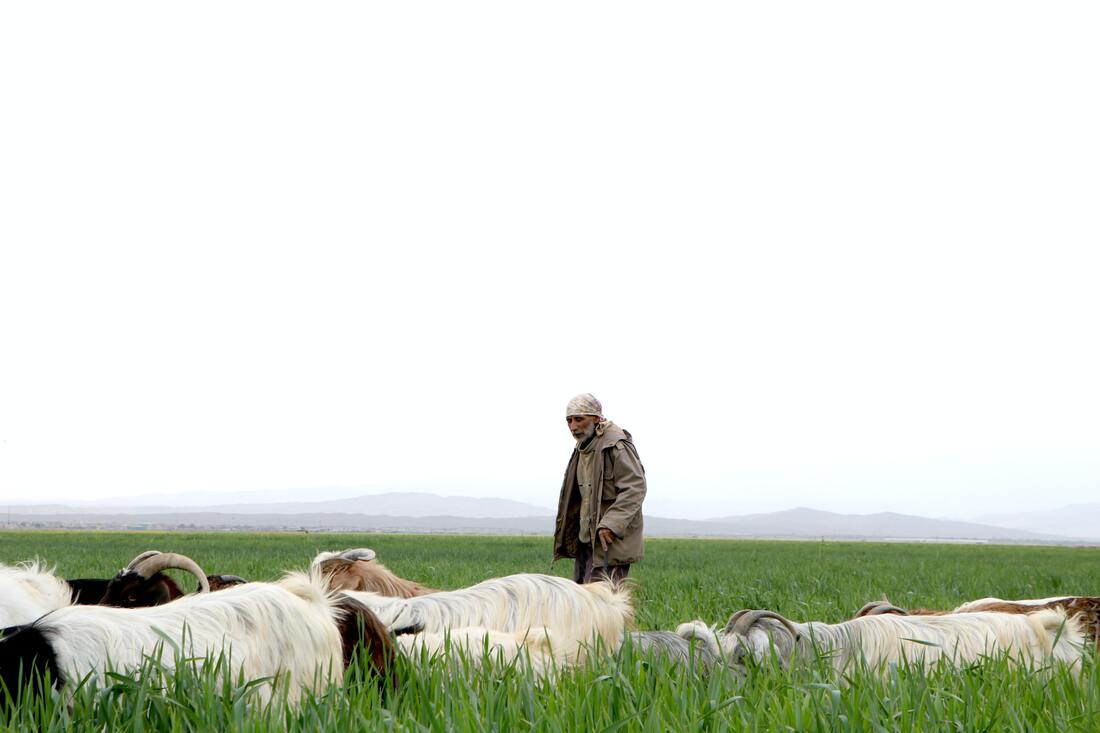|
Memorizing Psalm 23
The summer between my 10th and 11th grade year of high school, I took a 3-week trip out west with eight friends and three teachers. For three weeks we hiked up and down mountains, camped in tents, and fished for food. It was great. Only one night during those three weeks, on the way from one site to another, did we stay in a motel. One of the reasons why I’ll never forget that night is because it was that night a friend helped me memorize the 23rd Psalm. I had a Sunday School teacher who had memorized it and I had always admired him for that. It inspired me to do the same. So, with our motel Gideon’s Bible, over the course of a couple of hours, my friend helped me memorize Psalm 23. I’ve remembered it ever since. The Comforting Power of Psalm 23 Psalm 23 is one of the most widely recognized Scriptures in all the Bible, right up there with John 3:16. I’ve read it to the older members of my church who are homebound. I’ve read it to our folks who’ve been in the hospital or in hospice care. And, of course, we often read it together at funeral services. It’s very familiar to many of us and can be a great source of comfort when we need it most. In fact, I would encourage you to take the time to memorize Psalm 23. It’s such a blessing to place God’s Word deep in our hearts and minds so we can recall it during tough times. Written By a Shepherd Psalm 23 was written by a shepherd, a shepherd who was also the son of a shepherd. King David was often called the “Shepherd of Israel.” He certainly knew what he was talking about as he referred to shepherds and sheep. I think it’s important to remember that shepherds were the lowest of the low in the social circles of their day. That fact ought to amaze us because it was to shepherds that the angels came to announce the birth of Jesus. And it was a lowly shepherd boy who was chosen by God to be King over Israel. God doesn’t look at people the way we often do. It’s also fascinating that God chose the metaphor of “shepherd” to describe himself in his relationship with us. Job Description So, what was the job description of a shepherd? A shepherd would actually live with his sheep 24 hours a day with unwavering devotion, day and night, both in fair weather and bad, to nurture, guide, and protect his sheep. The shepherd would assume full responsibility for the needs and safety of his flock, even risking his own life for their protection. (Holman OT Commentary) Isn’t it awesome that the King of the universe, the Creator of all there is, chose to call himself a shepherd? But David points out that the Lord isn’t just a shepherd, or even the shepherd, but he is my shepherd. He’s your shepherd. He’s our shepherd. Bad Shepherds How precious and comforting those words must have been for the people of Israel, generations later, as those appointed to “shepherd” them, often betrayed them. Take in these words from Ezekiel 34:7-10, 7 “‘Therefore, you shepherds, hear the word of the Lord: 8 As surely as I live, declares the Sovereign Lord, because my flock lacks a shepherd and so has been plundered and has become food for all the wild animals, and because my shepherds did not search for my flock but cared for themselves rather than for my flock, 9 therefore, you shepherds, hear the word of the Lord: 10 This is what the Sovereign Lord says: I am against the shepherds and will hold them accountable for my flock. I will remove them from tending the flock so that the shepherds can no longer feed themselves. (Emphasis mine) God takes this very seriously. That’s why Jesus picked up this theme about bad shepherds when he said in John 10:8, 10, All [shepherds] who ever came before me were thieves and robbers… The thief [false shepherd] comes only to steal and kill and destroy; Our Good Shepherd Therefore, in light of those bad, untrustworthy, and false shepherds who were stealing from God’s people and leading them astray, here’s what God said in Ezekiel 34:11-12, 14-16a, 1 “‘For this is what the Sovereign Lord says: I myself will search for my sheep and look after them. 12 As a shepherd looks after his scattered flock when he is with them, so will I look after my sheep. I will rescue them from all the places where they were scattered on a day of clouds and darkness. 14 I will tend them in a good pasture, and the mountain heights of Israel will be their grazing land. There they will lie down in good grazing land, and there they will feed in a rich pasture on the mountains of Israel. 15 I myself will tend my sheep and have them lie down, declares the Sovereign Lord. 16 I will search for the lost and bring back the strays. I will bind up the injured and strengthen the weak, (Emphases mine) That sounds like Psalm 23 in action, doesn’t it? That sounds like the ministry of Jesus in action, doesn’t it? Jesus emphasized this role of a good shepherd when he said he came so the sheep “could have life, and have it to the full.” Jesus said he was the good shepherd and that he lays down his life for the sheep. Isn’t that the kind of shepherd you want watching over you, leading and guiding you, protecting you, and caring for you? The Shepherd We Need and Want The good shepherd leaves 99 of his sheep that are safe and secure so he can go out and find the one sheep that’s lost and in danger. And then he celebrates once he’s finds it. Don’t you want that kind of shepherd? Our Good Shepherd meets our physical needs. Verse 1 says, we will lack nothing. Our Good Shepherd meets our emotional needs – Verse 2 says, “he leads me beside quiet waters.” Our Good Shepherd meets our spiritual needs – Verse 3 says, “he refreshes my soul.” Our Good Shepherd meets all our needs, our needs for living each day, our deepest needs. Verse 3 says, he guides us along right paths (v. 3). Even when we walk through the darkest valleys of our lives, we don’t need to fear because he has promised to be with us during those times (v. 4). And best of all, God promises his sheep that our relationship with our Good Shepherd is not temporary, but eternal. Verse 6 says, Surely your goodness and love will follow me all the days of my life, and I will dwell in the house of the Lord forever. Isn’t that the kind of Shepherd you want guiding you, feeding you, protecting you, seeking you, sacrificing for you, knowing you, and healing you as you travel through this life? Isn’t that the Shepherd you want to call upon when you’re too scared and too panicked to lie down and rest in green pastures? Isn’t that the Shepherd you want leading you down the right paths of life, giving you his living water when you’re thirsty? Isn’t that the Shepherd you want protecting you as you travel, as Amazing Grace puts it, “through the many dangers, toils, and snares” of this world? And isn’t that the Shepherd you want at the end of your life, as you prepare to cross the waters of death? David reminds us that that Shepherd is not just a shepherd, or just the shepherd, but he’s your Shepherd. And Jesus reminds us that he is that Shepherd, the Good Shepherd. Hebrews 13:20-21 puts it this way, 20 Now may the God of peace, who through the blood of the eternal covenant brought back from the dead our Lord Jesus, that great Shepherd of the sheep, 21 equip you with everything good for doing his will, and may he work in us what is pleasing to him, through Jesus Christ, to whom be glory for ever and ever. Amen. (emphasis mine) This very same Good Shepherd (great Shepherd) can be your Good Shepherd if you’ll answer the call of his voice to trust and follow him, wherever he leads you. Walking Points
0 Comments
The Heidelberg Catechism: Lord's Day 10
27. Question: What do you understand by the providence of God? Answer: God's providence is His almighty and ever present power,[1] whereby, as with His hand, He still upholds heaven and earth and all creatures,[2] and so governs them that leaf and blade, rain and drought, fruitful and barren years, food and drink, health and sickness, riches and poverty,[3] indeed, all things, come not by chance[4] but by His fatherly hand.[5] [1] Jer. 23:23, 24; Acts 17:24-28. [2] Heb. 1:3. [3] Jer. 5:24; Acts 14:15-17; John 9:3; Prov. 22:2. [4] Prov. 16:33. [5] Matt. 10:29. 28. Question: What does it benefit us to know that God has created all things and still upholds them by His providence? Answer: We can be patient in adversity,[1] thankful in prosperity,[2] and with a view to the future we can have a firm confidence in our faithful God and Father that no creature shall separate us from His love;[3] for all creatures are so completely in His hand that without His will they cannot so much as move.[4] [1] Job. 1:21, 22; Ps. 39:10; James 1:3. [2] Deut. 8:10; I Thess. 5:18. [3] Ps. 55:22; Rom. 5:3-5; 8:38, 39. [4] Job 1:12; 2:6; Prov. 21:1; Acts 17:24-28. The Heidelberg Catechism: Lord's Day 9
26. Question: What do you believe when you say: I believe in God the Father almighty, Creator of heaven and earth? Answer: That the eternal Father of our Lord Jesus Christ, who out of nothing created heaven and earth and all that is in them,[1] and who still upholds and governs them by His eternal counsel and providence,[2] is, for the sake of Christ His Son, my God and my Father. [3] In Him I trust so completely as to have no doubt that He will provide me with all things necessary for body and soul,[4] and will also turn to my good whatever adversity He sends me in this life of sorrow.[5] He is able to do so as almighty God,[6] and willing also as a faithful Father.[7] [1] Gen. 1 and 2; Ex. 20:11; Job 38 and 39; Ps. 33:6; Is. 44:24; Acts 4:24; 14:15. [2] Ps. 104:27-30; Matt. 6:30; 10:29; Eph. 1:11. [3] John 1:12, 13; Rom. 8:15, 16; Gal. 4:4-7; Eph. 1:5. [4] Ps. 55:22; Matt. 6:25, 26; Luke 12:22-31. [5] Rom. 8:28. [6] Gen. 18:14; Rom. 8:31-39. [7] Matt. 6:32, 33; 7:9-11. |
Stand FirmBe on your guard; stand firm in the faith; be courageous; be strong. Do everything in love. Categories
All
Archives
July 2023
|



 RSS Feed
RSS Feed
